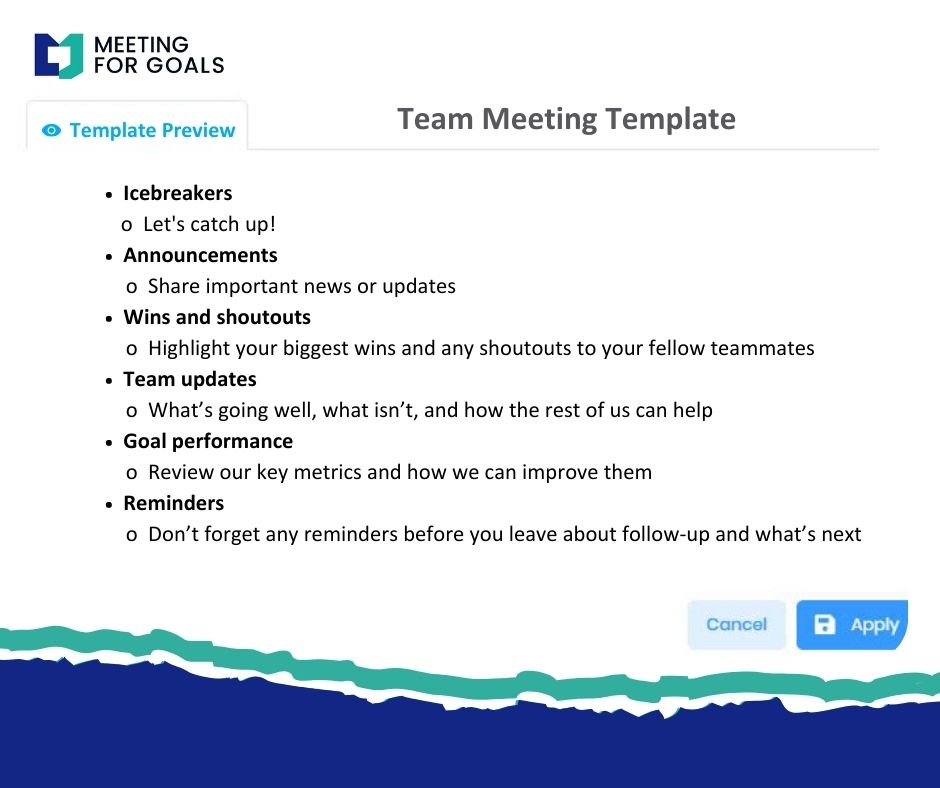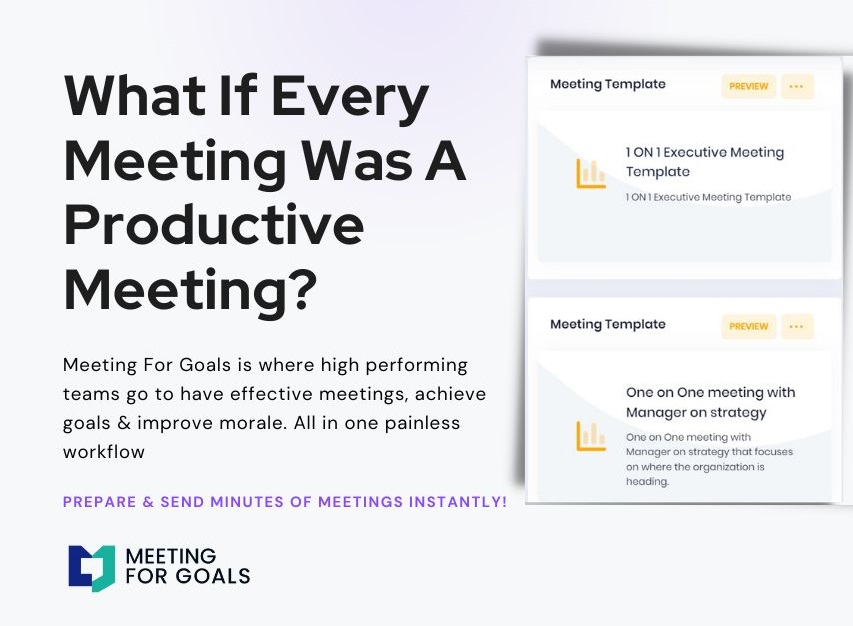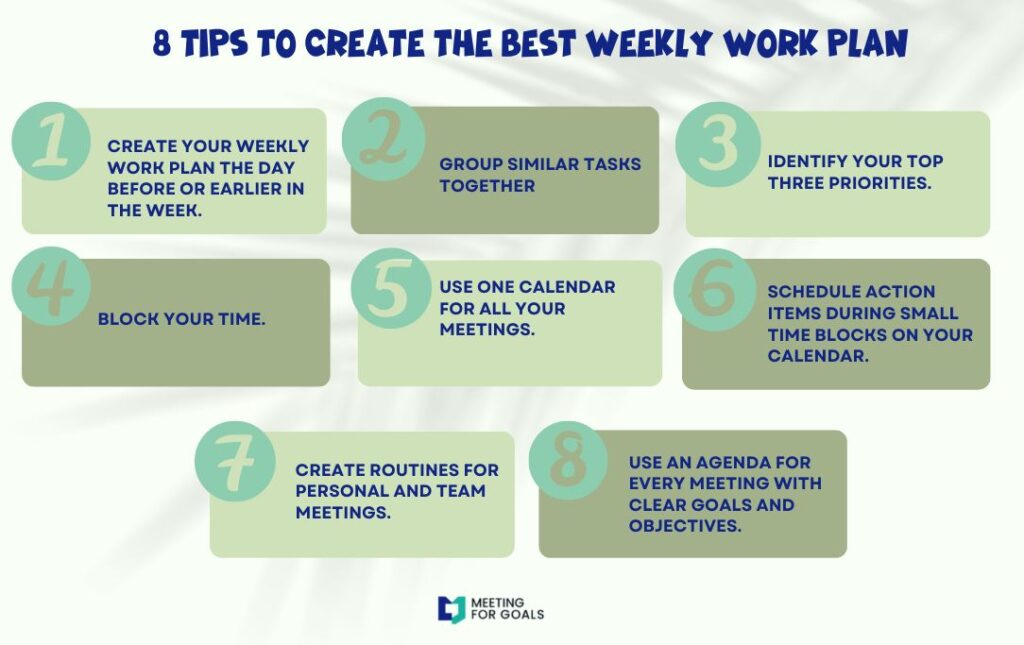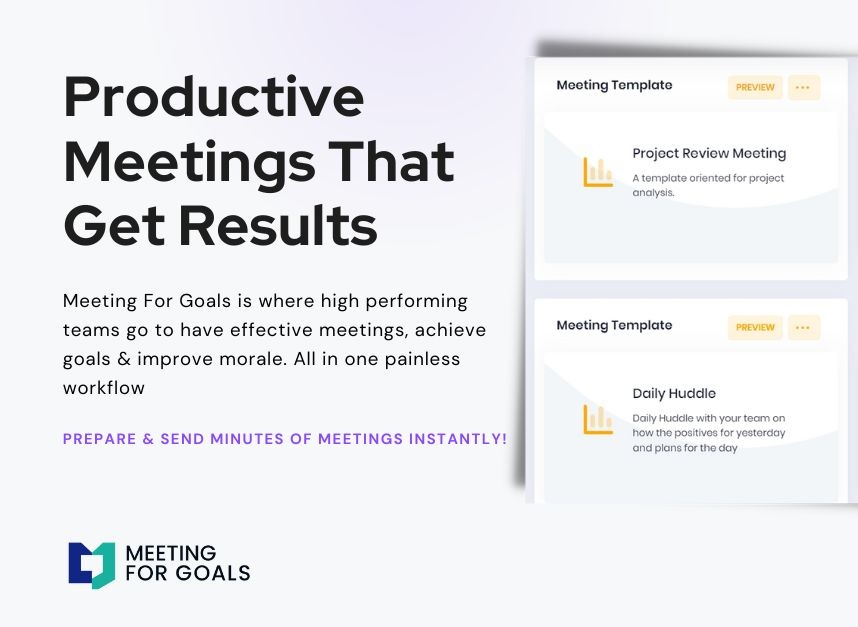Understanding Offsite Meaning: A Strategic Guide for High-Performing Teams
In today’s fast-paced corporate world, effective meetings are no longer optional—they’re essential. As companies strive to enhance productivity, align teams, and foster collaboration, offsite meetings have emerged as a powerful strategy. But what does “offsite” really mean in a business setting? And how can your team use offsite meetings to achieve real, measurable results?
This guide breaks it all down. Whether you’re a VP, director, or executive leading a team of 40 to 70 employees, this article will help you unlock the full potential of offsite meetings. You’ll learn what offsite meetings are, why they matter, and how to plan them for maximum impact. Along the way, we’ll show you how tools like Meeting For Goals can turn your meetings into strategic game-changers.
To get started with better meetings today, check out our free meeting templates at https://meetingforgoals.com/meeting_templates or sign up at https://app.meetingforgoals.com/TenantRegistration/Register.
I. Introduction
Corporate teams today face constant pressure to innovate, stay aligned, and hit aggressive targets. In this environment, offsite meetings are gaining popularity—not as a perk, but as a strategic necessity.
Offsite meetings take your team out of the daily grind. They allow them to think bigger, collaborate better, and focus on what truly matters. For teams between 40 and 70 people, especially those led by forward-thinking executives, offsite meetings can be a game-changer.
At Meeting For Goals, we help teams streamline their meetings—onsite or offsite. This ensures they’re shorter, sharper, and more aligned with business goals. Our meeting management platform helps you plan, track, and follow up on meetings with ease.
This article is your complete guide to offsite meetings. We’ll cover everything from definitions and benefits to planning tips and tech tools. Let’s dive in.
2 Minute Video
Watch a 2 minute demo of our meeting management software in action.
II. What Does Offsite Really Mean?
In business, “offsite” refers to any meeting that happens away from your usual office space. It could be:
- A strategy session at a nearby hotel.
- A team-building retreat in the mountains.
- A brainstorming day at a coworking space.
The goal? Step away from everyday distractions so your team can focus, connect, and innovate.
Onsite vs. Offsite
Onsite meetings happen at your company’s location. They’re convenient, but often come with distractions. Common issues include:
- People getting pulled into other tasks.
- Frequent interruptions.
- Creative thinking taking a backseat.
Offsite meetings offer a fresh environment. They remove daily interruptions and create space for deeper conversations. When you change the setting, you change the energy—and that can lead to better outcomes.
Popular Offsite Locations
Choosing the right spot is key. Here are a few great options:
- Retreat Centers: Perfect for team-building and long-term planning.
- Conference Hotels: Great for larger groups and formal agendas.
- Coworking Spaces: Flexible and modern, ideal for creative sessions.
- Outdoor Venues: Parks or lodges can inspire fresh thinking.
- Cultural Spaces: Museums or galleries add a unique twist.
Choose a location that matches your goals. A strategy meeting might need a quiet, focused space. A morale-boosting retreat might do better somewhere fun and relaxed.
To explore how you can structure your offsite with purpose, visit our free templates at https://meetingforgoals.com/meeting_templates.
Adding an Agenda
How to add an agenda instantly on Meeting For Goals.
III. Why Offsite Meetings Work
Offsite meetings aren’t just about a change in scenery—they’re about a change in mindset. Here’s why they’re so powerful:
- Stronger Team Bonding
When people step out of the office, they tend to open up. Offsite meetings encourage more authentic conversations and deeper connections. This helps break down silos and improves cross-functional collaboration. Whether through structured activities or informal chats over lunch, offsites create space for real teamwork to grow.
- Fresh Thinking
Let’s face it—daily routines can kill creativity. Offsite meetings give your team a mental reset. By stepping away from their desks, people can think more strategically and come up with new ideas. A simple change of environment can spark innovation. That’s why many creative teams use offsites to brainstorm campaigns, solve problems, or reimagine processes.
- Focus on Strategy
In the office, it’s easy to get caught up in the day-to-day. Offsite meetings give you time to focus on the big picture—company goals, KPIs, and long-term plans. With Meeting For Goals, you can link every agenda item to a specific business objective. That way, your offsite stays focused and productive.
- Boosted Morale
People enjoy a change of pace. Offsite meetings show that leadership values the team’s well-being—and that leads to higher morale. When employees feel appreciated and engaged, they’re more likely to stay motivated and loyal. That’s a win for everyone.
- Leadership Development
Offsite settings are great for identifying and developing future leaders. You’ll see who steps up, who brings ideas, and who’s ready for more responsibility. These meetings are also ideal for coaching, mentoring, and succession planning.
For more on the benefits of offsite meetings, check out this article from Harvard Business Review.
IV. Planning a Successful Offsite
A great offsite doesn’t happen by accident. It takes planning, structure, and the right tools. Here’s how to do it right:
- Set Clear Goals
Start with the end in mind. What do you want to accomplish? Are you aligning on strategy? Solving a challenge? Building relationships? Set specific, measurable goals and share them with your team ahead of time. Meeting For Goals lets you input objectives directly into your meeting plan so everyone arrives prepared.
- Pick the Right Venue
The location sets the tone. Think about:
- Accessibility
- Technology needs
- Ambiance
- Breakout space
For example, a leadership retreat might need a quiet, secluded venue. A creative session might benefit from a vibrant, open space.
- Build a Smart Agenda
Structure matters. Your agenda should include:
- Start and end times
- Session topics
- Breaks and meals
- Time for informal interaction
Use Meeting For Goals to build and share your agenda. You can assign roles, track action items, and keep everyone aligned.
- Invite the Right People
Only include those who are essential to the meeting’s purpose. Too many people can dilute the conversation. Too few might limit input.
- Prep in Advance
Send out materials, data, or pre-read documents ahead of time. Ask participants to come with ideas or feedback. This saves time and makes discussions more productive.
- Use the Right Tools
Meeting For Goals makes it easy to plan, run, and follow up on your offsite. You can:
- Set goals
- Assign tasks
- Track progress
- Stay aligned with KPIs
V. Connecting Offsite Meetings to Your Business Strategy
One of the biggest mistakes companies make? Treating offsite meetings like isolated events. The best offsites are tightly connected to your strategic goals.
Align with KPIs
Start by linking your agenda to your company’s key metrics. Whether it’s revenue, customer satisfaction, or operational efficiency, make sure each session supports your larger vision.
Meeting For Goals allows you to do this seamlessly. You can tie each agenda item to a business goal and track it over time.
Create Accountability
Great ideas are useless without follow-through. That’s why it’s crucial to assign ownership and deadlines during your offsite.
With Meeting For Goals, you can assign tasks, set reminders, and monitor progress—all in one place. This keeps momentum going long after the meeting ends.
Real-World Example
A mid-sized SaaS company used Meeting For Goals to plan their Q3 strategy offsite. They set goals in advance, shared pre-reads, and built a clear agenda.
During the offsite, they used the platform to document key decisions and assign follow-ups. Afterward, they continued tracking progress through the software.
The result? A 25% increase in goal completion and stronger team alignment.
Looking for a tool to help you do the same? Sign up now at https://app.meetingforgoals.com/TenantRegistration/Register.
VI. Tips for a Memorable Offsite
Want your offsite to stand out? Here are a few bonus tips:
- Mix work with fun: Include team-building activities or social events.
- Keep it interactive: Use breakout sessions, workshops, or group challenges.
- Bring in a facilitator: An outside expert can keep things on track.
- Follow up: Send a summary and action plan after the meeting.
Also, consider using platforms like Trello or Notion to organize content. But for meetings specifically, Meeting For Goals is purpose-built to keep everything aligned with your objectives.
VII. Conclusion
Offsite meetings are more than just a break from the office. They’re a strategic opportunity to align your team, spark innovation, and drive meaningful results.
But to get the most out of them, you need structure, clarity, and follow-through. That’s where Meeting For Goals comes in.
Our platform helps you plan smarter, stay on track, and turn every meeting—onsite or offsite—into a strategic advantage. From setting goals to tracking outcomes, we’ve got you covered.
Ready to run better meetings? Explore our templates at https://meetingforgoals.com/meeting_templates or sign up today at https://app.meetingforgoals.com/TenantRegistration/Register.
Optimize your meetings. Empower your team. Achieve your goals.
Visit https://meetingforgoals.com to learn more.
External References:
- Harvard Business Review: What Every Leader Needs to Know About Offsites – https://hbr.org/2020/01/what-every-leader-needs-to-know-about-offsites
- Forbes: Why Offsite Meetings Are Critical to Your Company’s Success – https://www.forbes.com/sites/forbeshumanresourcescouncil/2022/06/27/why-offsite-meetings-are-critical-to-your-companys-success/
Word Count: Approx. 2,150 words.




